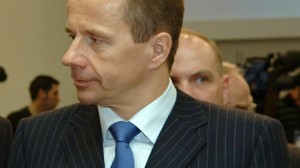
"We spoke better English. In Latvia they spoke better Russian, and in Lithuania more Polish and Russian," Ligi told BusinessWeek. Photo used courtesy of NATO.
Estonian finance minister Jürgen Ligi is exemplary of the Estonian political class: a Reform Party loyalist, Ligi formerly served as minister of defense and easily glided into the finance minister’s seat when Reform and IRL booted SDE out of the coalition last year.
Ligi was of interest last week for an interview with journalist Justin Vela in BusinessWeek. In the piece, you can see how Estonia is trying to spin its highly probably 2011 Eurozone entry in a regional context:
“When asked why Estonia attracted more investment during the 1990s than the other Baltic countries, the unabashedly pro-Western Ligi responded, ‘We spoke better English. In Latvia they spoke better Russian, and in Lithuania more Polish and Russian.'”
The minister said the Baltic countries differ more than usually portrayed. Estonia, he said, is influenced more culturally and economically by Finland and Sweden, its main trading partners. Latvia is mostly influenced by Russia, and Lithuania by Poland. Nordic telecommunications and electronics companies and banks have invested heavily in Estonia since the fall of the Soviet Union.
Ligi said it is Estonia’s orientation toward the wealthy and well-run Nordic economies and the investment and business they offer that allowed Estonia to develop more quickly than the country’s southern neighbors and to recover from the financial crisis faster.”
Ligi also weighs in on Estonia’s recent economic crisis:
“For me the emotional moment when I realized the severity of the crisis came in 2007,” Ligi said. “We were too optimistic. In society and in government.”
There are other interesting opinions in the piece. A recommended read.
Justin Petrone is an American writer living in Estonia and the author of the best-selling travel novel “My Estonia.” He publishes one of the best-written blogs in the Baltic states, Itching for Eestimaa.
Disclaimer:
Views expressed in the opinion section are never those of the Baltic Reports company or the website’s editorial team as a whole, but merely those of the individual writer.












